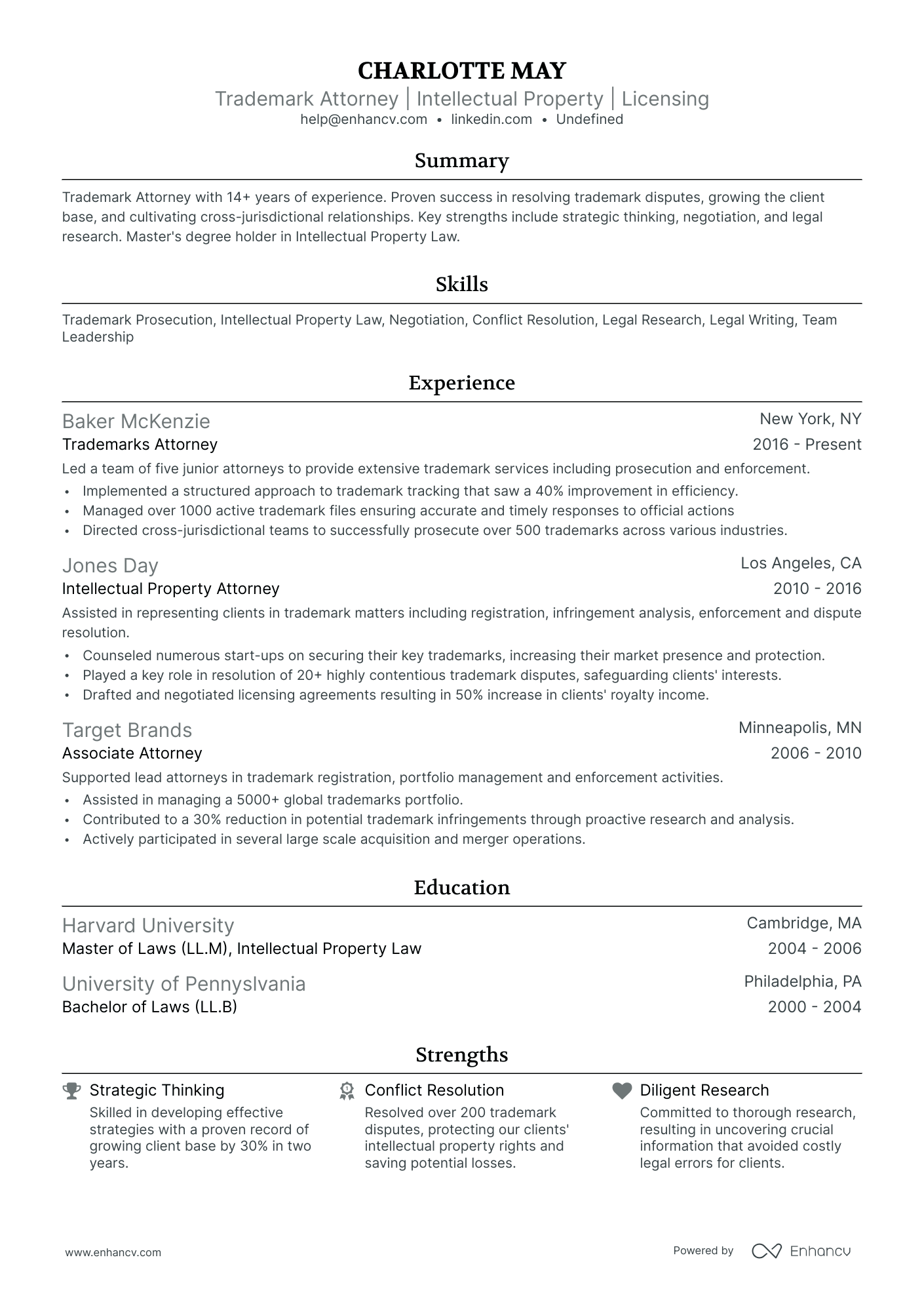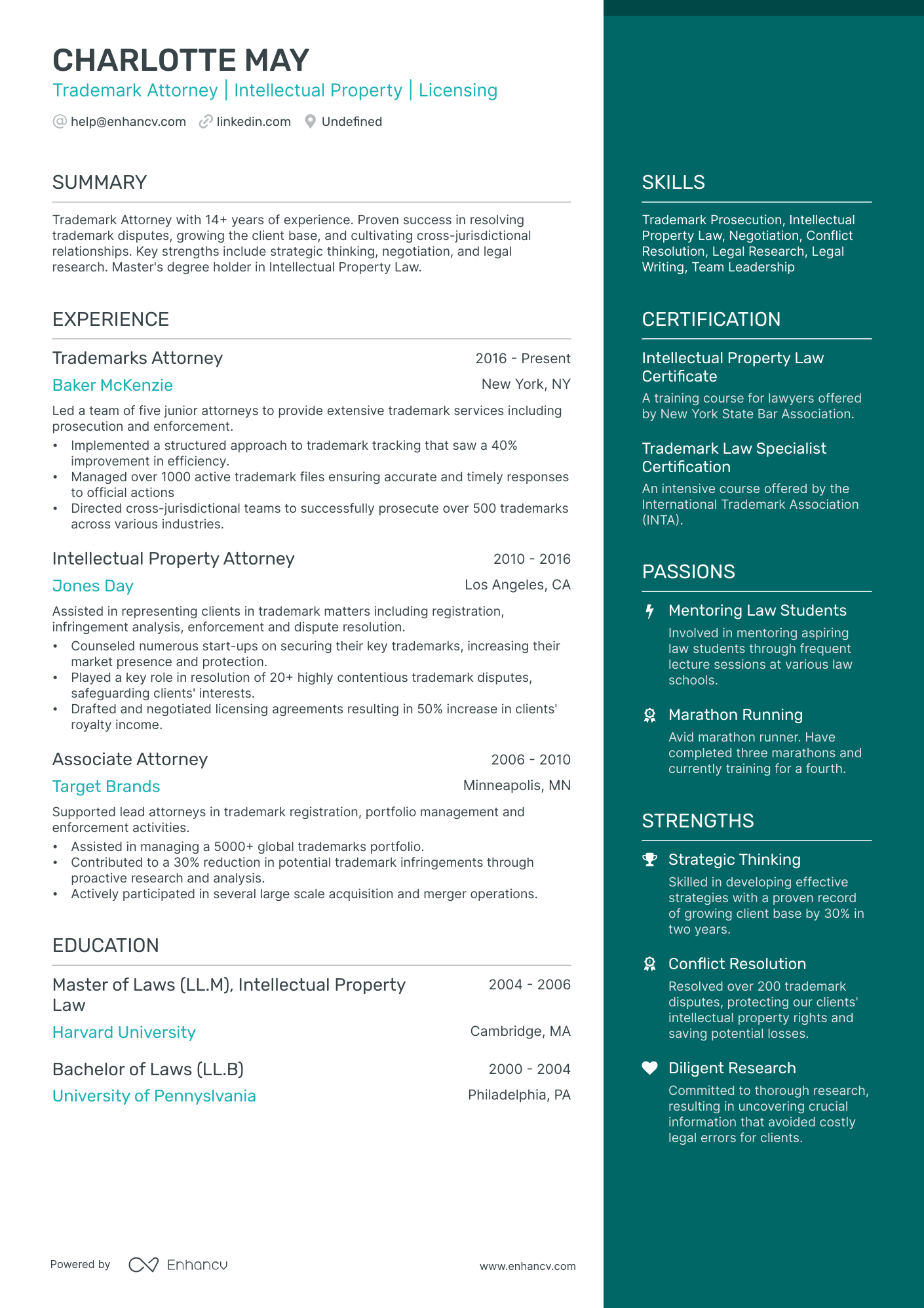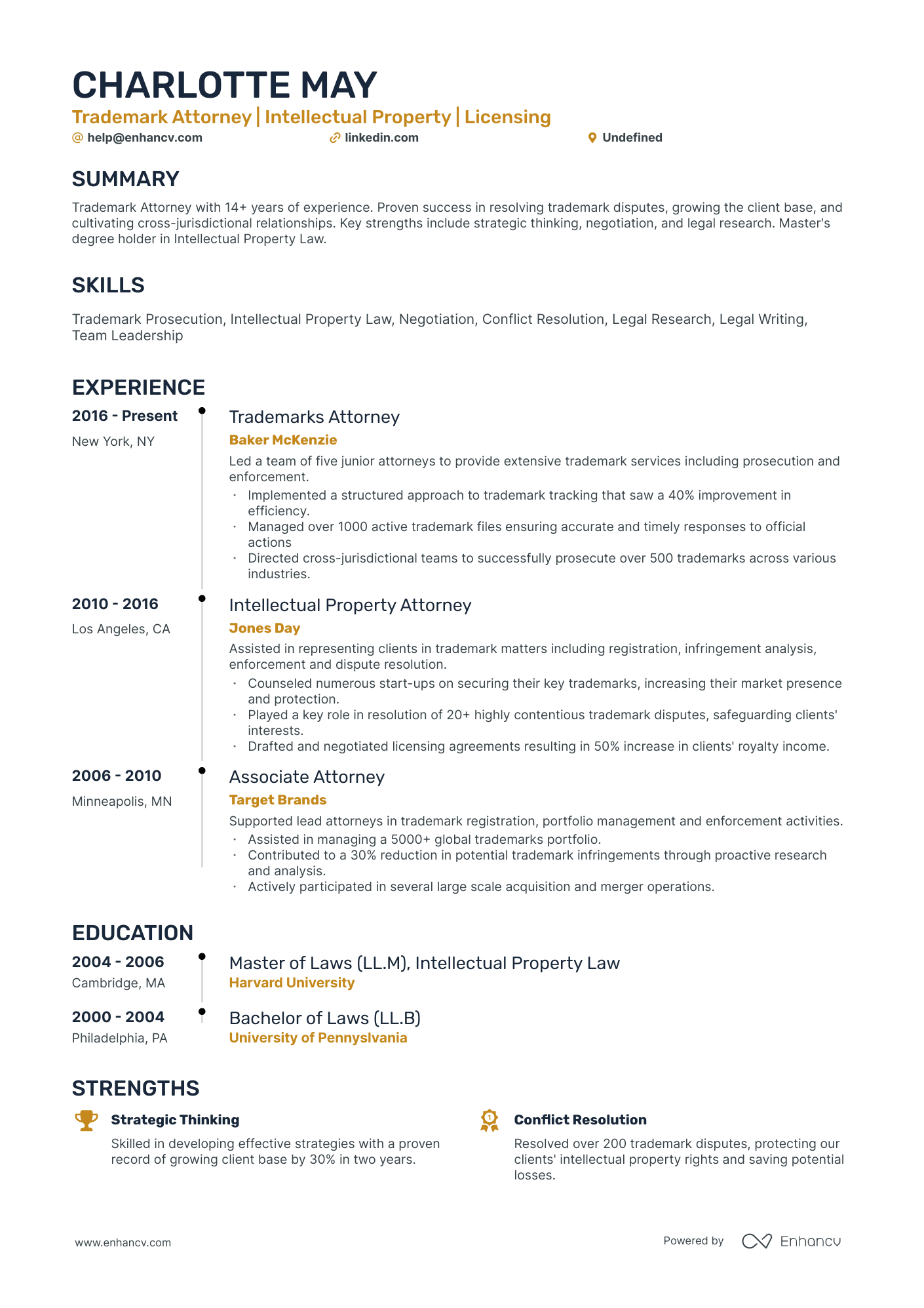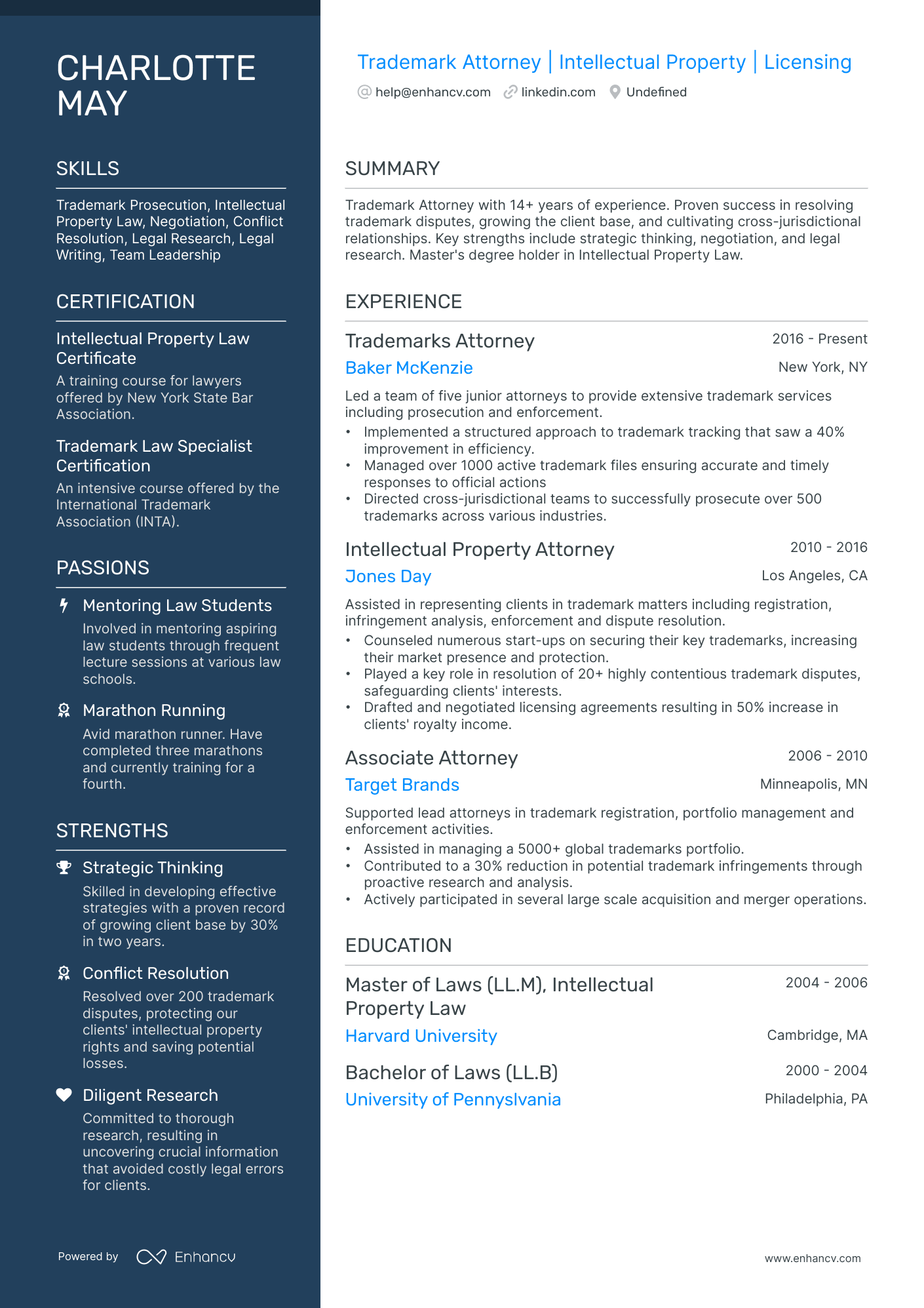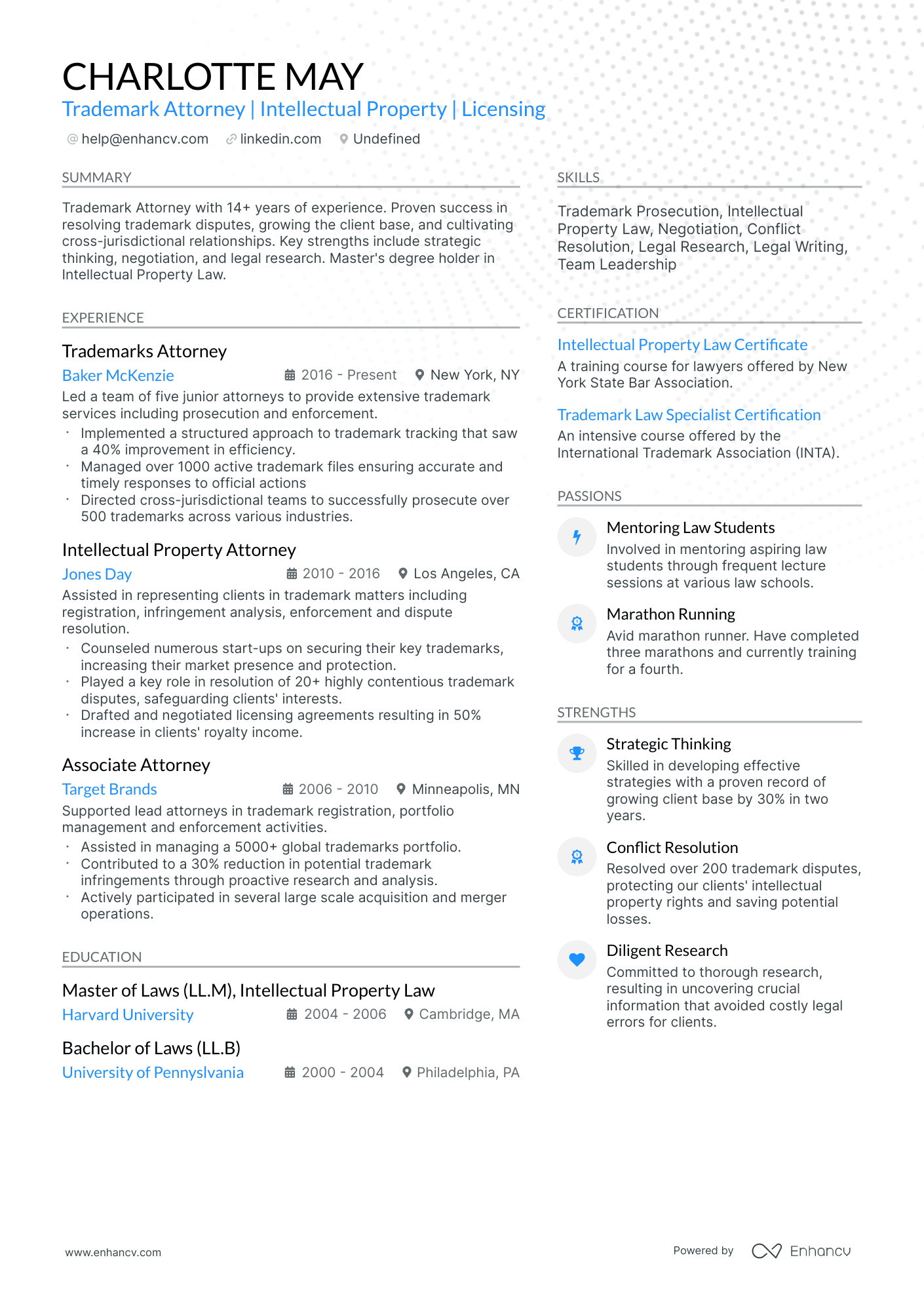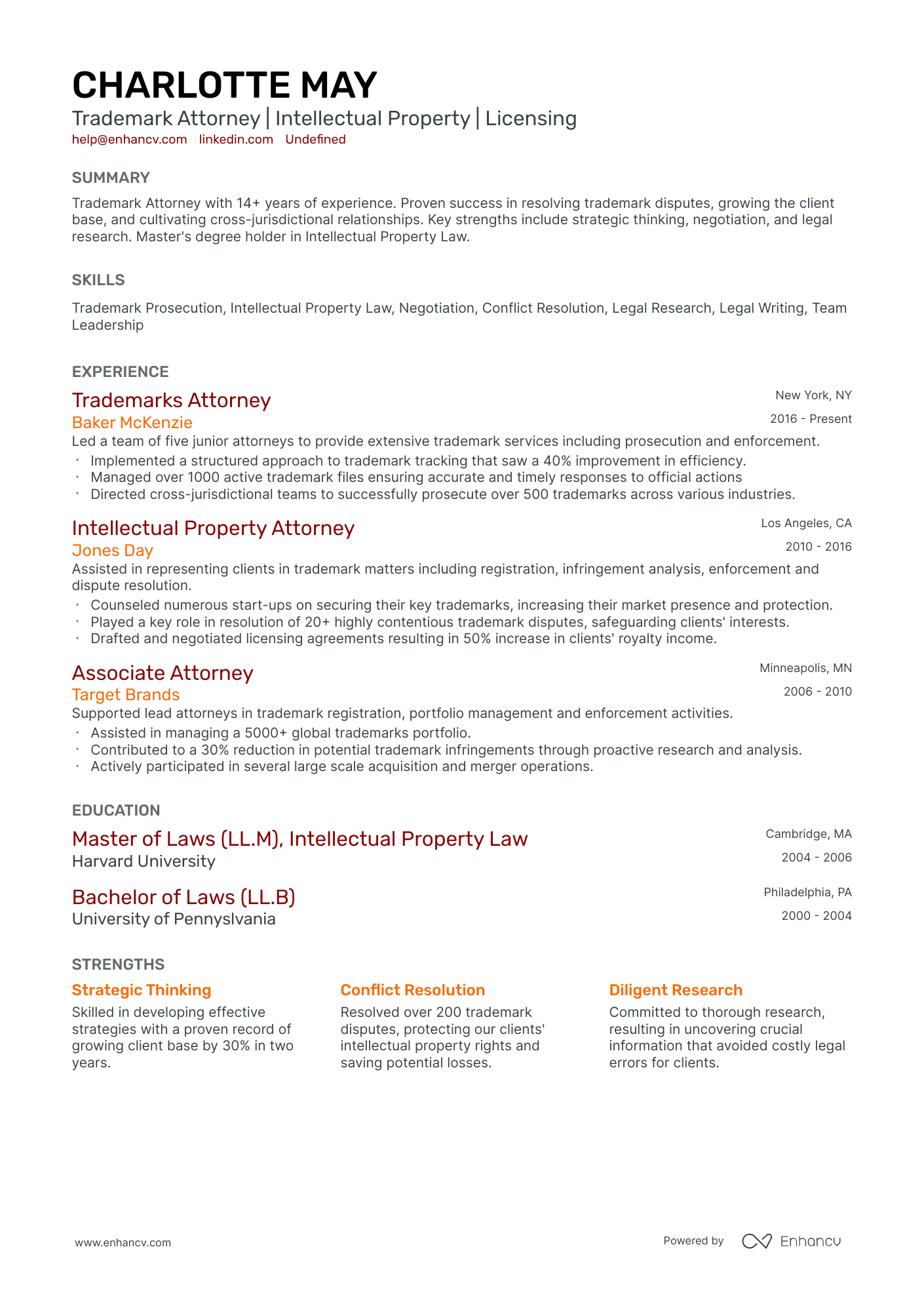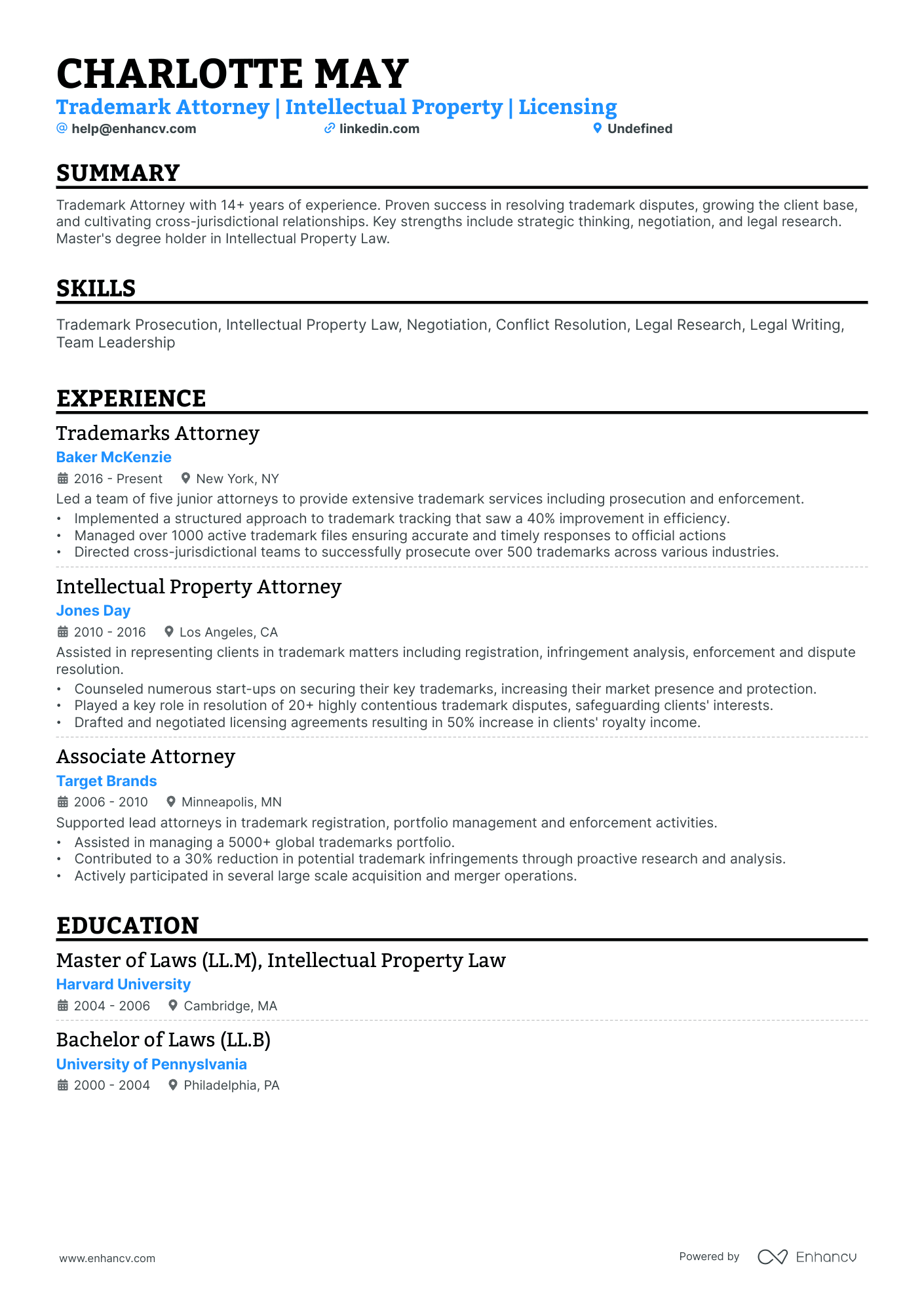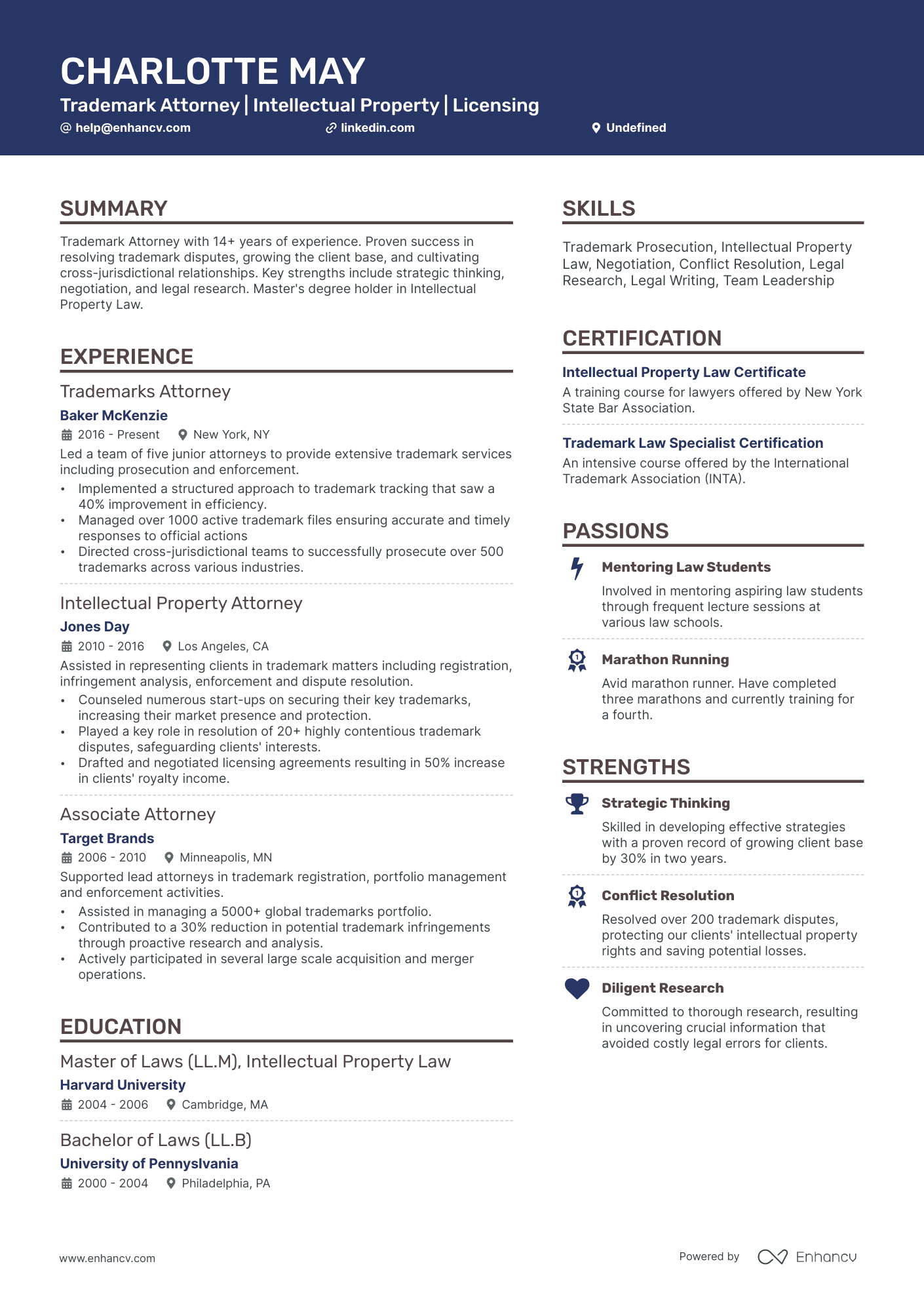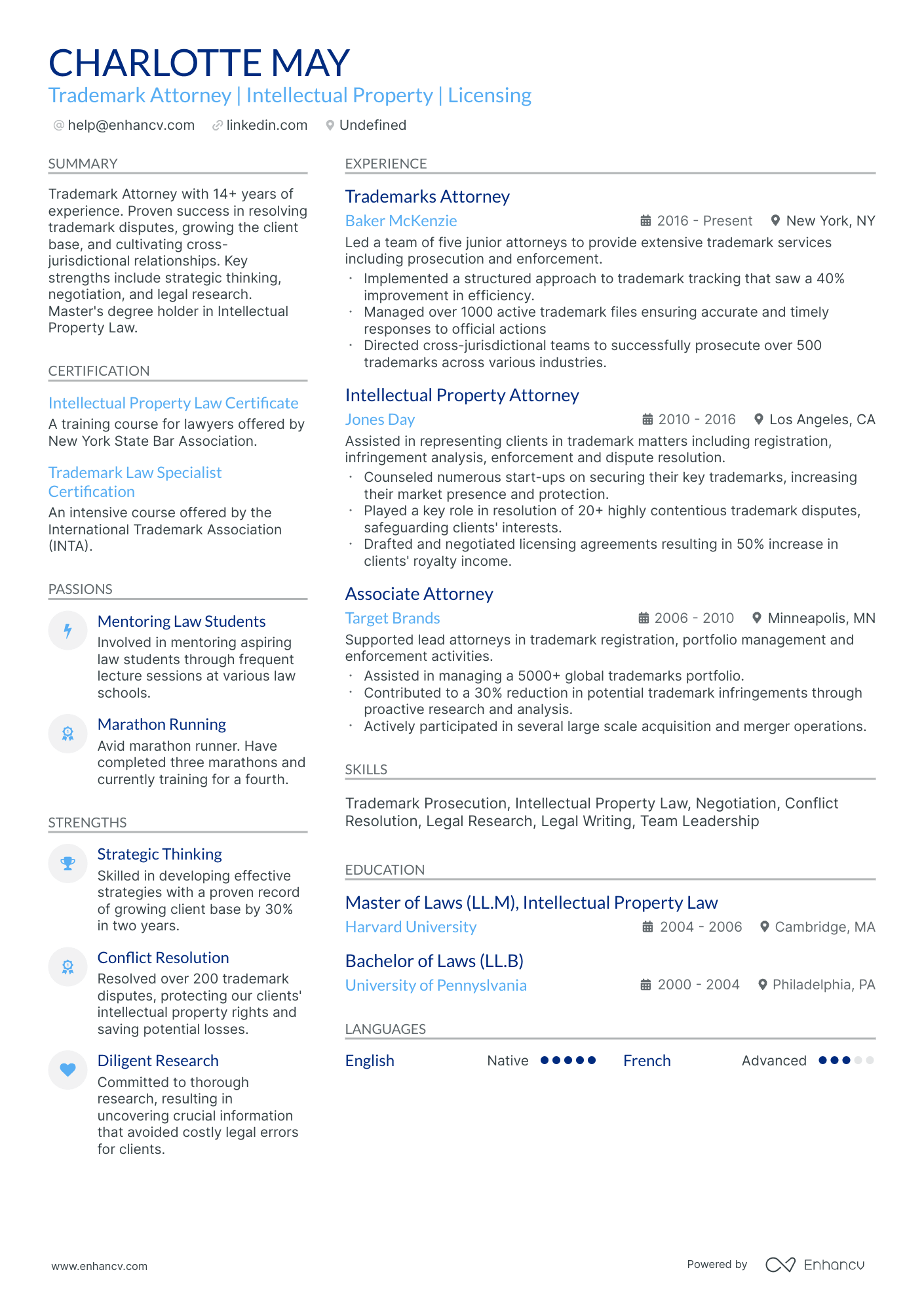A specific resume challenge faced by a trademark attorney is often demonstrating their technical expertise in various areas of intellectual property law whilst highlighting their ability to effectively communicate with non-legal stakeholders. Our guide can assist in addressing this challenge by providing specific advice and examples on how to concisely articulate complex legal concepts, and showcasing transferable soft skills such as negotiation and relationship management within the professional experience section of your resume.
Dive into our comprehensive guide to crafting a standout trademark attorney resume:
- Discover trademark attorney resume samples that have secured positions at top-tier companies.
- Master the aesthetics of your resume layout for maximum impact.
- Strategically present your achievements and skills across various resume sections.
- Convey to recruiters why you're the perfect fit for the job.
Recommended reads:
Structuring your trademark attorney resume to engage recruiters
The presentation of your trademark attorney resume is crucial.
Is it easy to read and well-organized? Does it have a logical flow?
Avoid overwhelming recruiters with a cluttered document. Instead, follow these best practices to ensure a consistent resume format:
- Include a header in the top third of your trademark attorney resume for easy contact and quick access to your professional portfolio or LinkedIn profile.
- In the experience section, start with your most recent role and detail your career in a reverse-chronological order.
- Unless specified, submit your resume as a PDF to maintain its layout. Some companies might request other formats.
- If you're applying for a senior position and have over a decade of relevant experience, a two-page trademark attorney resume is acceptable. Otherwise, aim for a single page.
Consider your target market – resumes in Canada, for example, follow different layout conventions.
Upload your resume
Drop your resume here or choose a file. PDF & DOCX only. Max 2MB file size.
Pro tip
Consider incorporating design elements like icons or charts to enhance your resume's visual appeal and readability. But remember, the key is subtlety; don't let design overshadow content.
Essential trademark attorney resume sections for a comprehensive overview:
- Header: Enables recruiters to swiftly access your contact details and peruse your latest work portfolio.
- Summary or Objective: Offers a snapshot of your career milestones and aspirations.
- Experience: Demonstrates alignment with job prerequisites and highlights your tangible contributions.
- Skills: Captures the full spectrum of your expertise, making you a compelling trademark attorney candidate.
- Education & Certifications: Bridges potential experience gaps and underscores your dedication to the field.
What recruiters want to see on your resume:
- Experience with trademark search and prosecution, demonstrating a solid understanding of intellectual property laws
- Track record in managing trademark portfolios, showcasing an ability to effectively maintain and strategize for clients' brands
- Certification or degree in intellectual property law, proving formal education and specialized knowledge in the field
- Evidence of successful trademark dispute resolution, indicating skill in negotiation and litigation
- Proficiency in various trademark databases and management tools, revealing technical competency relevant to the role
Recommended reads:
Detailing your relevant experience on your trademark attorney resume
Showcase your credibility in the resume experience section. For an effective trademark attorney resume:
- Highlight measurable achievements.
- Scan the job advert for keywords and integrate them throughout your experience section.
- Emphasize your technical proficiencies and how you've applied them in various roles.
- Keep it simple: mention your responsibility, relevant skills, and the outcomes.
- Use this section to convey your unique value, soft skills, feedback received, and the type of company culture you thrive in.
Top professionals ensure their experience section offers a captivating look at their expertise. Check out our sample trademark attorney resumes for guidance.
- Represented clients in trademark infringement lawsuits, resulting in successful resolution and monetary compensation.
- Conducted comprehensive trademark searches to identify potential conflicts and advised clients on clearance strategies.
- Managed a portfolio of over 200 trademarks, handling all aspects of registration, maintenance, and enforcement.
- Drafted and negotiated licensing agreements for the commercial use of trademarks.
- Assisted in developing trademark protection strategies for international expansion.
- Advised clients on trademark registration procedures, resulting in successful completion of over 100 applications.
- Conducted due diligence reviews of trademark portfolios during company mergers and acquisitions.
- Collaborated with outside counsel on global trademark enforcement actions.
- Assisted in resolving domain name disputes through UDRP proceedings.
- Provided legal opinions on trademark validity and infringement issues.
- Managed trademark litigation cases, including drafting pleadings, conducting discovery, and negotiating settlements.
- Developed and implemented trademark watch programs to monitor potential infringements and unauthorized use.
- Advised clients on brand protection strategies, resulting in increased market share and brand recognition.
- Conducted IP training sessions for company employees to promote trademark awareness and compliance.
- Participated in cross-functional teams to evaluate and mitigate intellectual property risks in new product launches.
- Managed the prosecution of trademark applications, resulting in a 30% reduction in registration time.
- Provided legal advice on trademark usage guidelines and brand standards for marketing campaigns.
- Assisted clients in negotiating coexistence agreements to resolve trademark disputes amicably.
- Developed and implemented strategies to combat counterfeit goods in collaboration with law enforcement agencies.
- Presented seminars on trademark law updates at industry conferences and client events.
- Led a team of trademark attorneys in managing a high-volume caseload, ensuring timely filing and response deadlines.
- Negotiated favorable settlements in complex trademark infringement disputes, saving clients millions in potential damages.
- Coordinated international trademark portfolio management, including registrations, renewals, and oppositions.
- Developed and implemented an online trademark monitoring system to identify potential infringements proactively.
- Drafted and reviewed trademark-related agreements, including co-branding agreements and consent letters.
- Collaborated with clients' marketing teams to develop and protect new brands, resulting in successful market penetration.
- Managed trademark disputes through negotiation and alternative dispute resolution processes.
- Conducted IP due diligence for corporate transactions, identifying potential risks and providing mitigation strategies.
- Prepared and filed trademark applications with the USPTO and managed the prosecution process.
- Provided legal counsel on domain name issues and assisted in resolving domain disputes.
- Advised clients on global trademark protection strategies, resulting in successful registrations across multiple jurisdictions.
- Managed trademark opposition and cancellation proceedings before the Trademark Trial and Appeal Board (TTAB).
- Collaborated with foreign associates to coordinate trademark filings and enforcement actions worldwide.
- Drafted and negotiated coexistence agreements to resolve trademark conflicts amicably.
- Provided training and mentorship to junior attorneys on trademark law and practice.
- Assisted in drafting cease and desist letters and settlement agreements, resulting in favorable outcomes for clients.
- Managed the renewal and maintenance of trademark registrations, ensuring compliance with statutory requirements.
- Conducted trademark audits to assess potential infringement risks and advised on mitigation strategies.
- Researched and prepared legal opinions on trademark availability and registrability.
- Represented clients in domain name dispute resolution proceedings under ICANN policies.
- Collaborated with cross-functional teams to develop and execute global trademark filing strategies.
- Managed international trademark portfolios, coordinating with local counsel for registrations and enforcement actions.
- Reviewed and negotiated co-branding agreements and sponsorship contracts with high-profile partners.
- Conducted due diligence on third-party trademarks for potential licensing and acquisition opportunities.
- Developed internal trademark policies and guidelines to ensure brand consistency and protection.
- Provided legal advice and counseling on trademark issues, including clearance, registration, and enforcement.
- Managed domain name portfolios, overseeing the acquisition and protection of valuable domain assets.
- Assisted in drafting and negotiating intellectual property provisions in commercial contracts.
- Represented clients in appeals before the USPTO Trademark Trial and Appeal Board (TTAB).
- Conducted IP training sessions for corporate employees to raise awareness of trademark best practices.
Quantifying impact on your resume
<ul>
Addressing a lack of relevant trademark attorney experience
Even if you lack direct trademark attorney experience, you can still craft a compelling resume. Here's how:
- Highlight projects or publications that demonstrate your relevant skills or knowledge.
- Emphasize transferable skills, showcasing your adaptability and eagerness to learn.
- In your objective, outline your career aspirations and how they align with the company's goals.
- Consider a functional or hybrid resume format, focusing on skills over chronological experience.
Recommended reads:
Pro tip
Boost your resume by focusing on the practical aspects of each job requirement. While it's good to have job-related keywords on your resume, ensure they're backed by action verbs and quantifiable data. This gives recruiters a clear picture of your trademark attorney professional journey.
Spotlighting your trademark attorney hard and soft skills
Hard skills denote your technological proficiency and expertise in specific tools or software. These skills are often validated through certifications and hands-on experience.
Soft skills, on the other hand, reflect your interpersonal abilities and how you navigate workplace dynamics. These skills are cultivated over a lifetime and can be more nuanced.
Why the emphasis on both? Hard skills demonstrate your technical competence and reduce training needs. Soft skills suggest adaptability and cultural fit.
To optimize your skills section:
- Forego basic skills like "Excel" in favor of more specific proficiencies like "Excel Macros".
- Highlight core values and work ethics as soft skills, indicating what you prioritize in a professional setting.
- If relevant, create a distinct section for language proficiencies.
- Balance hard and soft skills by crafting a strengths or achievements section, illustrating outcomes achieved through both skill sets.
To assist you, we've curated a list of skills highly sought after by recruiters. Ensure you integrate those that resonate with your expertise and the prospective employer's needs:
Top skills for your trademark attorney resume:
Trademark Law
Intellectual Property Management Software
Legal Research Tools
Contract Drafting Software
Trademark Search Databases
Case Management Systems
Document Management Software
Online Filing Systems
Trademark Monitoring Tools
IP Portfolio Management Tools
Attention to Detail
Analytical Thinking
Effective Communication
Negotiation Skills
Problem-Solving
Time Management
Client Relationship Management
Adaptability
Team Collaboration
Critical Thinking
Pro tip
The placement of your skills section should align with its importance. If it's a showcase of your most significant strengths, position it prominently near the top of your resume.
how to properly list your resume's education and certifications
Don't underestimate the importance of your resume education section , as it oftentimes helps you further tailor your resume to the job ad.
When writing your education section:
- Include the most relevant degree you have with information about the institution and dates of start and completion;
- If you're in the process of obtaining your degree, include your expected graduation date;
- Consider leaving off degrees that aren't relevant to the job or industry;
- Add bullet points to show how you gained valuable experience relevant for the job in an academic environment.
When describing your resume certifications , always consider their relevancy to the role.
Use the same format to describe them as you will for your education. If you're wondering what are the best certificates for trademark attorney roles, check out the list below.
Best certifications to list on your resume
Pro tip
Remember, certifications can be woven into various resume sections, like experience or summary. Detail how a particular certification enhanced your performance or opened new opportunities.
Recommended reads:
best practices for your trademark attorney resume summary or objective
How do you know if you should include a resume summary or a resume objective?
- Resume summaries are ideal for trademark attorney professionals with more experience, who'd like to give a quick glimpse of their biggest career achievements in the top one-third of their resumes.
- On the other hand, resume objectives serve as a road map to the applicant's aspirations. Candidates use the objective as the North Star of their career (or, how they see themselves in the role in the next few years).
Both could be the perfect fit for your trademark attorney resume, depending on your experience.
Here's how candidates for the trademark attorney job structure their summaries and objectives.
Resume summary and objective examples for a trademark attorney resume
- With over 15 years of expertise in intellectual property law, a seasoned trademark attorney has effectively represented multinational corporations in various industries. Known for developing strategic brand protection plans and successfully handling complex litigation cases. Recipient of the 'Outstanding Legal Professional' award in 2022.
- An established Attorney with a background in corporate law now specializing in trademark issues. Leveraging 10+ years of experience and proven negotiation skills to navigate intellectual property complications. Successfully facilitated the transition of a traditional manufacturing company to an e-commerce business model while managing their IP concerns.
- Accomplished IP Lawyer with a decade's worth of experience in the entertainment industry, aiming to apply deep knowledge of copyright laws to protect brands in new segments. Recognized for successfully managing a record-breaking high-profile IP dispute case involving a famous music record label.
- Proficient software engineer with a recent law degree, keen to utilize technical knowledge alongside new legal expertise in becoming a trademark attorney. Expertise includes understanding of tech patents and strong grasp of digital rights management.
- A highly motivated recent Law graduate seeking an entry-level trademark attorney role. Aim to leverage acquired academic knowledge and internship experiences to manage trademark registration, renewal processes, and infringement issues to safeguard client interests.
- Eager Paralegal with a strong interest in intellectual property law, seeking to venture into the role of a trademark attorney. Committed to combining learned legal principles with honed research skills to ensure effective brand protection and representing clients in contentious matters.
Enhancing your trademark attorney resume with additional sections
Make your trademark attorney resume truly distinctive by adding supplementary sections that showcase:
- Awards that underscore your industry recognition.
- Projects that bolster your application's relevance.
- Hobbies, if they can further your candidacy by revealing facets of your personality.
- Community involvement to highlight causes you champion.
Key takeaways
- Effective trademark attorney resumes are well-structured, weaving a compelling career narrative.
- Choose between a resume summary or objective based on your experience and the impression you aim to create.
- If lacking in direct experience, leverage other roles, such as internships or contract positions, to demonstrate alignment with the trademark attorney role.
- Be discerning in listing hard and soft skills, ensuring relevance and showcasing outcomes.
- Always tailor your resume for each trademark attorney application, ensuring alignment with job requirements.
